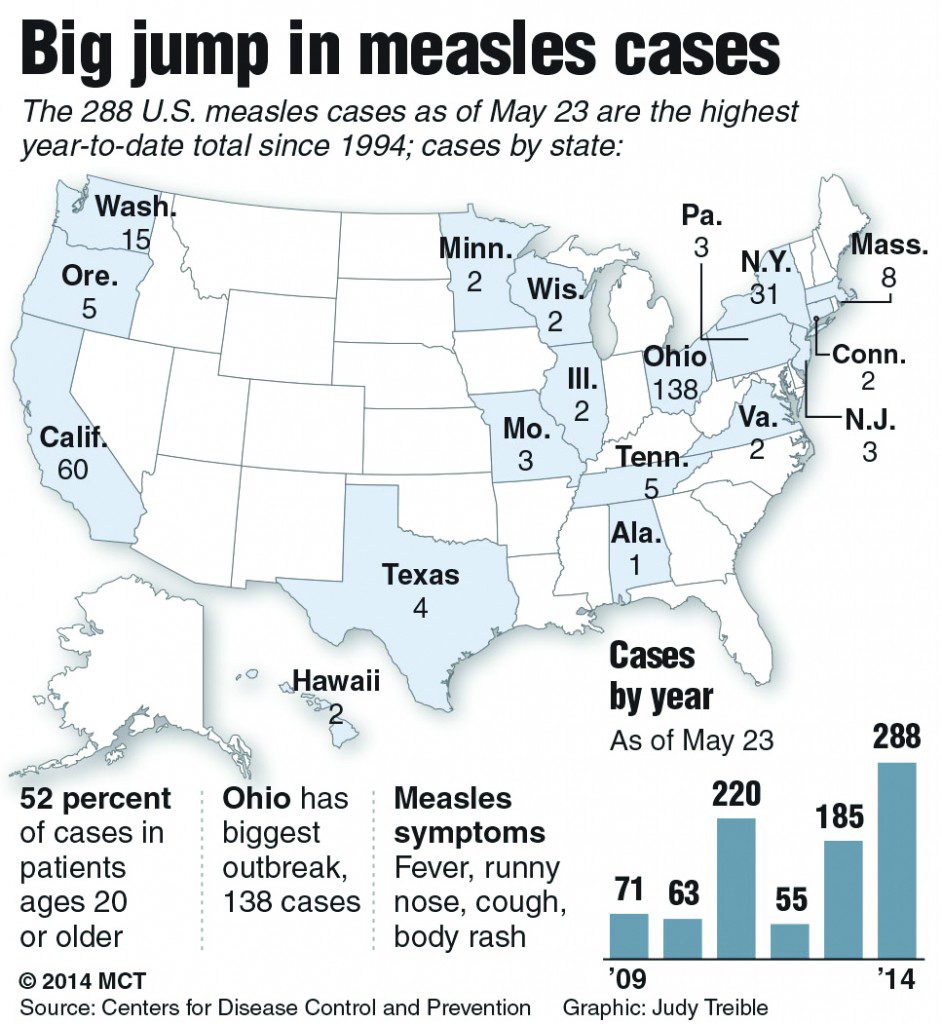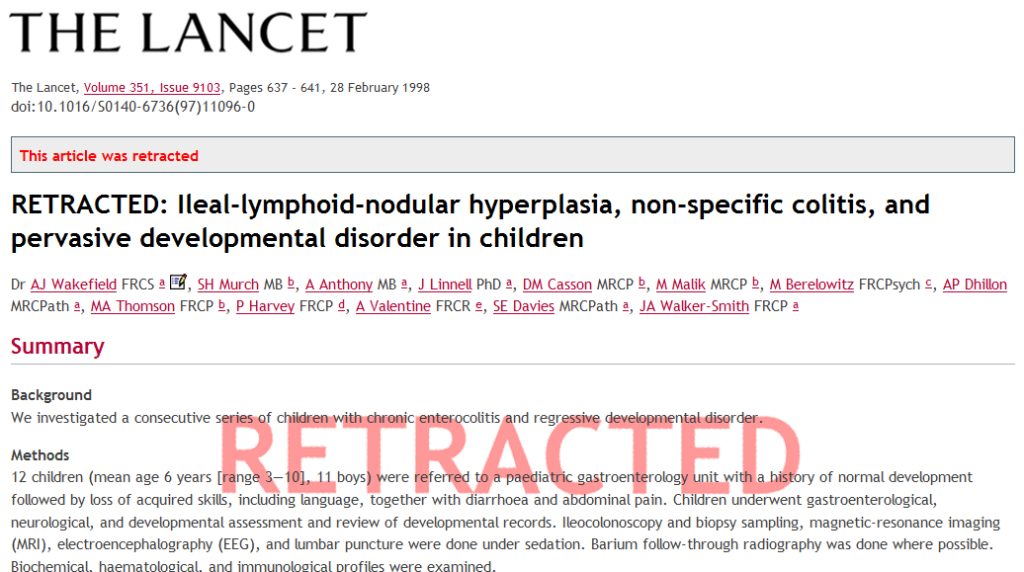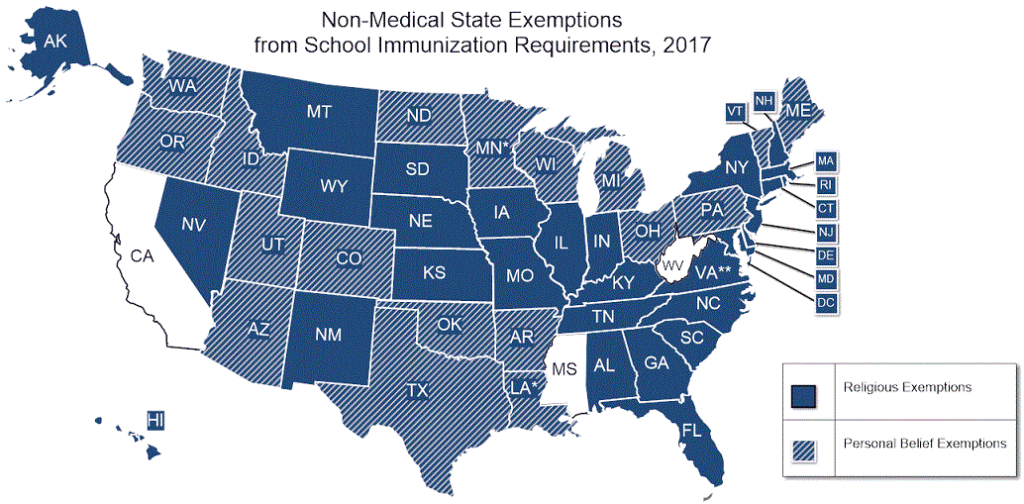CLOSING VACCINATION LOOPHOLES

 BY GRANT MERCER – In December of 2014, 40 people who had either visited or worked at California’s Disneyland contracted measles. Two months later, the disease had spread to at least another 150 people in six states. Nearly 20% of those affected, ranging in age from six weeks to 70 years old, were hospitalized. The California Department of Public Health attributed this outbreak to a pocket of unvaccinated persons acting as a breeding ground for this highly contagious disease. Measles, considered eradicated in the United States since the year 2000, was making an ugly comeback.
BY GRANT MERCER – In December of 2014, 40 people who had either visited or worked at California’s Disneyland contracted measles. Two months later, the disease had spread to at least another 150 people in six states. Nearly 20% of those affected, ranging in age from six weeks to 70 years old, were hospitalized. The California Department of Public Health attributed this outbreak to a pocket of unvaccinated persons acting as a breeding ground for this highly contagious disease. Measles, considered eradicated in the United States since the year 2000, was making an ugly comeback.
To prevent future outbreaks of vaccine-controllable diseases, all children should be vaccinated, with exemptions allowed only for medical reasons. While all 50 states currently have existing vaccination requirements for children entering school, they allow exemptions for religious and philosophical differences, as well as for medical reasons. While medical exemptions require detailed documentation from a physician, philosophical and religious reasons simply require a notarized statement attesting to the parents’ desire to forego vaccinations. These philosophical and religious differences are a danger to public health and should be stopped.
According to the World Health Organization (WHO), vaccine-preventable diseases are responsible for approximately 1.5 million deaths annually worldwide. These deaths are concentrated in countries that have low vaccination rates, such as India, the Philippines, and South Africa; however, Americans are not immune from viruses that originate in foreign lands. In fact, the Disneyland outbreak was linked to a measles strain found in the Philippines. A recent visitor to the Philippines most probably visited the theme park prior to experiencing any symptoms, spreading the highly contagious virus. The Centers for Disease Control (CDC) stresses that a 95% vaccination rate is required to keep these diseases from once again gaining a foothold in the United States. Yet only 15 states hit that target for all vaccine-preventable diseases. By accepting any exemption other than medical ones as justification for avoiding vaccinations, the health of every American is jeopardized.
 Philosophical differences to vaccines are usually based on faulty data linking vaccines to autism. A 1998 paper published by Dr. Andrew Wakefield in the Lancet, a British medical journal, detailed his eight-year study connecting the Measles, Mumps, and Rubella (MMR) vaccine to children’s developmental disabilities. Basing his study on just 12 children, Wakefield claimed that eight of them developed autism or other development disabilities within three days of receiving the MMR vaccine. His analysis, albeit faulty, fueled a worldwide suspicion among parents about immunizations. The British Medical Association denounced the study as “an elaborate fraud” and revoked his medical license. Wakefield then moved to the United States and was embraced by the anti-vaccine movement. However, the American medical community agreed with their British counterparts. As leading immunization expert, Dr. Paul Offit, a pediatrician at Philadelphia’s Children’s Hospital, noted, “Westfield’s paper killed children.” Twenty states, including highly populated Texas and California, still allow philosophical differences as a reason to forego childhood vaccinations. A study disavowed by worldwide medical experts should not be allowed to negatively impact public health. Legislation should be passed to close this loophole.
Philosophical differences to vaccines are usually based on faulty data linking vaccines to autism. A 1998 paper published by Dr. Andrew Wakefield in the Lancet, a British medical journal, detailed his eight-year study connecting the Measles, Mumps, and Rubella (MMR) vaccine to children’s developmental disabilities. Basing his study on just 12 children, Wakefield claimed that eight of them developed autism or other development disabilities within three days of receiving the MMR vaccine. His analysis, albeit faulty, fueled a worldwide suspicion among parents about immunizations. The British Medical Association denounced the study as “an elaborate fraud” and revoked his medical license. Wakefield then moved to the United States and was embraced by the anti-vaccine movement. However, the American medical community agreed with their British counterparts. As leading immunization expert, Dr. Paul Offit, a pediatrician at Philadelphia’s Children’s Hospital, noted, “Westfield’s paper killed children.” Twenty states, including highly populated Texas and California, still allow philosophical differences as a reason to forego childhood vaccinations. A study disavowed by worldwide medical experts should not be allowed to negatively impact public health. Legislation should be passed to close this loophole.
Religious differences offer another means of avoiding vaccinations in 48 states. Ironically, no major religion – neither Judaism, Catholicism, Hinduism, Buddhism, Islam, nor Protestantism – prohibits vaccinations. In 2014, a measles outbreak in an Ohio Amish community infected 391 people, the majority of which were unvaccinated. While the Amish faith does not prohibit vaccinations, this particular community felt immunizations were unnecessary. Two children died as a direct result of this misguided rationale. Just as the California outbreak originated in a foreign country, the Ohio outbreak was linked to a strain with its roots in another country, this time in India. As relatively isolated as this Amish community was, measles from a half-a-world away found its way into its midst, eventually affecting not only their community, but others around them.
 In Connecticut, a Catholic man is suing a school to allow his son, unvaccinated for religious reasons, to admit his son. Yet, the Catholic church has stated that “there are no proper ground for refusing immunizations against dangerous infectious diseases.” Jewish leaders consider vaccinations important enough to set aside Shabbat restrictions when vaccinations were only available during these times. In the Christian faith, there are no scriptures prohibiting vaccinations. Religious leaders have accepted vaccinations as a moral responsibility, emphasizing the community over the individual in disease prevention.
In Connecticut, a Catholic man is suing a school to allow his son, unvaccinated for religious reasons, to admit his son. Yet, the Catholic church has stated that “there are no proper ground for refusing immunizations against dangerous infectious diseases.” Jewish leaders consider vaccinations important enough to set aside Shabbat restrictions when vaccinations were only available during these times. In the Christian faith, there are no scriptures prohibiting vaccinations. Religious leaders have accepted vaccinations as a moral responsibility, emphasizing the community over the individual in disease prevention.
The importance of vaccinations has been upheld by the U.S. Supreme Court. In Jacobson v. Massachusetts, the Court agreed with the state’s right to enforce mandatory vaccinations. Henning Jacobson refused smallpox vaccinations for himself and his children because of his fears of becoming ill from the vaccine. As the Supreme Court noted, the “freedom of the individual must sometimes be subordinated to the common welfare.” The Court also observed that “there are restraints to which each person is necessarily subject for the common good,” with vaccinations being counted among those restraints.
More recently, the U.S. Supreme Court in 2015 refused to heara case challenging New York’s vaccination requirement. A lower court had ruled that the requirement, which three parents had challenged after their children, unvaccinated for religious reasons, were prohibited from attending school, did not violate the constitutional rights of the children.The Court’s failure to hear the case signaled that mandating vaccinations is not a violation of constitutional rights.
Public health should never be held hostage to the whims of the individual. Through vaccines, the United States has broken free from the devastating diseases that still wreak havoc throughout many parts of the world. While some people may protest, citing infringement of their individual liberties, by choosing not to vaccinate they are infringing on the rights of others to avoid vaccine-preventable diseases. By closing these vaccination exemption loopholes, American lives – not probably, not maybe, but definitely – will be saved.
